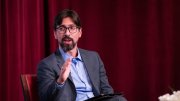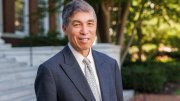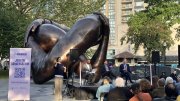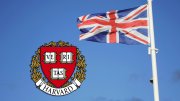During a meeting on April 15—Good Friday, and before the first Passover seder he celebrates with family friends—President Lawrence S. Bacow said he was pursuing the “balance between managing the crisis du jour and what I call playing long ball”: advancing Harvard’s teaching and research mission. That the ensuing conversation touched on the wildly diverse subjects that occupy a president and took place in person, for the first time in more than two years, without masking, all testified that this spring was indeed a new beginning.
Although the pandemic continues, coping with the endless crises it imposed on a residential academic institution no longer commanded the almost exclusive attention of University leaders. Indeed, on April 25, Bacow advised the community that routine coronavirus testing would end April 28 for nonresidential students, faculty, and staff, and on May 10 for those in campus housing. By mid May, managers announced that Harvard would close its clinical lab on June 30 and revert to contract viral testing via the Broad Institute—maintaining a reduced capacity for PCR tests, with longer turn-around times. Clearly, the institution was redirecting its attention to normal activities: Bacow resumed traveling, to London, California, and Washington, D.C., and Commencement and alumni planners mobilized for an in-person degree conferral, the 2020-2021 make-up degree confirmation, and reunion events scheduled for June 3.
Among the priorities he cited were:
Climate change. Bacow pointed to the work of vice provost for climate and sustainability James Stock, from consultation with faculty members and alumni to assembling a University academic advisory group to advance climate education. The most important near-term outcome of this work, one senses, will be to build capacity for research and education that draws upon all of Harvard’s resources—and so applies interdisciplinary thinking and policy solutions to what is a complex technological, economic, political, and cultural challenge.
The University’s professed strength is its ability to bring its expertise in law, public policy, business, public health and medicine, basic and applied science, education, religious studies, and the broad range of humanities and social sciences to bear on climate change and sustainability in a concerted way. Stock’s office, and his expertise in the field, are the most focused Harvard-wide effort to bring this about, and bear watching in the months ahead.
Research: the Kempner Institute. During the pandemic, Harvard made progress on intellectual initiatives, from urgent research on COVID-19 to the nascent quantum science venture. Perhaps none looms larger than the $500-million Kempner Institute for the Study of Natural and Artificial Intelligence, announced last December. Bacow said he had taken members of the governing boards on an April tour of the program’s 25,000-square-foot laboratory in the Allston science and engineering complex, at which the faculty co-directors, McKay professor of computer science and statistics Sham Kakade and Moorhead professor of neurobiology Bernardo Sabatini, described their work.
Speech. Asked if he had any concerns about free speech on campus, Bacow acknowledged that there was wide interest in the subject—and said Harvard had not had any problems with speakers being prevented from appearing. The issue had come up recently, he said, in meetings with the Board of Overseers, a briefing for the Business School dean’s advisory council, visits with members of Congress, and others. Other than two incidents—the Vietnam-era disruption of Defense Secretary Robert McNamara’s campus visit, and a divestment-related attempt to disrupt Bacow’s own talk at the Kennedy School in early 2019 (it was moved to a new site and proceeded)—he noted, “We’ve managed to avoid the kinds of issues that have plagued other places.” And, he continued, “We work at it.” Part of that work is fulfilling the “obligation to ensure that we have conservative speakers on campus,” Bacow said, mentioning recent appearances by former New Jersey governor Chris Christie and U.S. Senator Tim Scott (Republican of South Carolina).
Governance. In light of the pending transition from William F. Lee to Penny Pritzker as senior fellow of the Harvard Corporation (see below), Bacow said, “The Corporation is a really, really high-functioning group” now, with diverse perspectives among its “extraordinarily accomplished” members. During its deliberations, he said, “Everybody checks their ego at the door.” Members “talk about literally any issue, openly and candidly, they disagree with each other, but we always come together.” In his prior experience with governing boards (as president at Tufts and as a consultant and adviser during the years between that presidency and his current one), he said, that kind of candor and comity is not a given. That it is now, here, is a strength for the University. [Editor’s note: Pritzker will lead the search for a successor to Bacow as president, given his announcement on June 8 that he would step down at the end of the next academic year.]
Read a complete report at harvardmag.com/bacow-postpandemic-22.
In a sort of exit interview on May 11, Lee, the retiring senior fellow, pointed to the reforms approved in late 2010 as “one of the things that I feel best about” after 18 years of governing-board experience. Enlarging the Corporation to 13 members from seven, with expert committees on core fiduciary responsibilities such as finances and capital facilities, term limits, and an elected senior fellow, he said, have resulted in “better planning for Harvard, better implementation for Harvard,” and enhanced capacity to focus on larger, key issues.
Term limits—fellows are now elected for a six-year term, and can be elected for a second one—have had the effect of “constantly refreshing and replenishing the members of the Corporation,” Lee said. Fellows now serve at their best, and recently elected members “constantly bring in…new perspectives.”
Their expertise is further supplemented by the “enormously helpful” perspectives contributed by committee appointees who are not members of the governing boards: experts in finance, say, or capital projects and planning.
In combination with changes in management under the president, provost, and executive vice president, he continued, these changes enable the Corporation today to bring multiple talents to bear on both “key long-term strategic issues for the University,” the board’s most important role, and “the issues of the day”—like the response to COVID-19.
If the Corporation’s essential role is ensuring that 50 years hence, “Harvard is the same robust institution and community, with the same preeminent reputation” that it enjoys today, as he put it, its grasp of the overarching challenges and opportunities is of overriding consequence.
He mentioned three, the first stemming from his experience as counsel defending the University in the Students for Fair Admissions litigation challenging affirmative action (the consideration of race) in College admissions processes. “There is a sense,” Lee said, “and I think that it is incorrect, that the principles of diversity, equity, and inclusion, and the principles of free speech” are in conflict. In fact, they work together, and must be made to do so not only within Harvard, but in society at large, and indeed globally. “The manner in which institutions like Harvard address issues of diversity, equity, and inclusion, and free speech and free thought, [which] can all be pursued robustly on campus, are a challenge and an opportunity”—one that the Corporation sees very clearly, he emphasized.
A second reflects the fact that “Harvard exists today in the most robust life-science community in the world,” encompassing the medical and public-health schools, MIT, the hospitals, other universities, and local research institutes. Lee said that is “an extraordinary opportunity to bring together all of this talent, all of this institutional potential, in a way that benefits us nationally, globally, and, derivatively, institutionally.”
And third, enabling the development of Allston to proceed remains a priority on which the University is making progress, he maintained. “It is a wonderful opportunity for Harvard, but it also needs to be a wonderful opportunity for the people who live in it,” who have expressed concern recently about the scale, scope, and larger plans for development in coming years. Lee pointed to the science and engineering complex, the planned American Repertory Theater facility, and the planned University conference center within the commercial “enterprise research campus” as clear benefits, delivered or in the offing. “[If] done correctly,” he continued, the larger development “benefits the broader Allston community and not just the Harvard community, and we clearly understand that.”
Read about these issues, Lee’s perspective on the Harvard-MIT relationship, the governing boards’ daily relationship to the University community, and more at harvardmag.com/lee-challenges-22.








